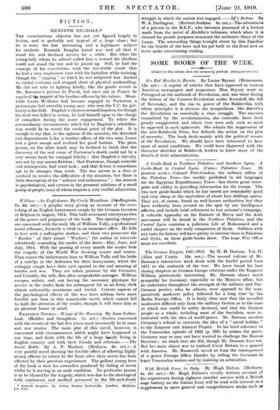The German Empire, 1867-1914. By W. H. Dawson. Vol. II.
(Allen and Unwin. 16s. net.)—The second volume of Mr. Davison's instructive work deals with the fateful period from 1871 to the outbreak of the war. We have found his four closing chapters on German foreign relations under the Emperor William particularly interesting. Mr. Dawson shows much sympathy for Germany, especially in the Morocco affair, btit he underrates throughout the strength of the military and Pan. German parties, who, he admits, were opposed to the com- paratively moderate policy followed for a long time by the Berlin Foreign Office. It is fairly clear now that the so-called moderates differed only from the military faction as to the time at which war could be safely declared, and that the German people as a whole, including most of the Socialists, were in- toxicated with the idea of world-power. Mr. Dawson ascribes Germany's refusal to entertain the idea of a " naval holiday " to the Emperor and Admiral Tirpitz. In his brief reference to the Venezuelan episode of 1902 (p. 393) he misses the point. Germany may or may not have wanted to challenge the Monroe Doctrine ; we think that she did, though Mr. Dawson does not. But her main object was to embroil Great Britain in a quarrel with America. Mr. Roosevelt saved us from the consequences of a grave Foreign Office blunder by telling the Germans to leave Venezuelan waters and by insisting on arbitration.






































 Previous page
Previous page